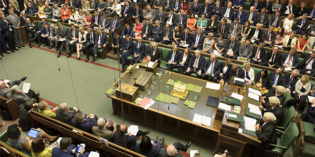EU referendum

Most populist radical right parties across Europe are not eager to leave the EU
After the 2016 Brexit referendum, there was speculation that other Eurosceptic parties across the EU would try to capitalise on the result and advocate their own countries’ exit. However, Stijn van Kessel finds that any initial enthusiasm among populist radical right parties for EU-exit quickly faded, and most have been muted or equivocal in their Euroscepticism, concentrating instead on more immediate concerns of voters, who generally do not prioritise the EU.

Brexit is happening – are EU citizens’ rights finally a done deal?
As the UK formally leaves the European Union this week, and enters the transition period, Alexandra Bulat assesses the flaws in the EU citizens’ Settlement Scheme and argues that it still undermines the fundamental rights of those affected.

Be careful what you wish for: Brexit and the call for another referendum
Whether or not to hold a referendum on Brexit is a clear dividing line between parties in the upcoming UK general election. However, Philipp Harms and Claudia Landwehr argue that support for such a measure is often largely contingent on expected outcomes, and so can entrench political divides. More deliberative democratic innovations might therefore be better suited to resolving the UK’s political conflicts.

Referendums can be more effective if voters can choose from several options
As the UK prepares for a second general election since the 2016 Brexit referendum, Charlotte C.L. Wagenaar demonstrates how a multi-option referendum could be a valuable tool in future to gauge more nuanced public attitudes on divisive issues. By presenting several alternatives, they can encourage votes for constructive compromises rather than blunt protest votes.

Are the DUP for turning? When the Union is perceived to be at risk, all options are on the table
The UK government’s latest attempt to push a deal through Parliament failed when the DUP withdrew support. Mary C. Murphy explains the DUP’s thinking and options. She writes that, while they can continue to pursue a strategy which is focused on revising the deal to their satisfaction, it is also possible that they could change tack completely and re-align their position in favour of the UK remaining in the EU.

The Brex Factor: how a citizens’ assembly on Brexit could learn from reality TV
Some politicians and political scientists have suggested that a citizens’ assembly would be the best way to build public consent for any Brexit solution. For this to work, argues Conor Farrington, any initiative would need to innovate to engage the public, and in this it could learn from mass television entertainment.

A Brexit Assembly offers a way of overcoming the current deadlock
Brexit needs its own dedicated assembly, a Brexit Assembly, argues Hjalte Lokdam. The Brexit process has revealed the difficulty of addressing a question of such extraordinary constitutional and societal significance within the ordinary parliamentary process. A Brexit Assembly of extraordinary representatives dedicated only to Brexit offers a way of overcoming the current deadlock.

This government has already lost the confidence of the House of Commons: the response should be to replace the government, not to neuter parliament
The government and Parliament cannot agree how to proceed with Brexit. For some, the solution is for the government to prorogue Parliament and implement its Withdrawal Agreement without the confidence of the Commons. David Howarth argues that given the Fixed Term Parliament Act means a general election will not necessarily follow from such a loss of confidence, a new government formed by MPs from across the Commons is a viable option.

A tale of two failures: poor choices and bad judgements on the road to Brexit
How did we get where we are on Brexit? Many major political events are shaped by institutions and long-term social changes, but the political choices of leaders matter too. Ben Worthy assesses how the short-term decisions of David Cameron and Theresa May have led to this avoidable Brexit mess.

Brexit and devolution in England: what’s at stake
The debate on Brexit has spurred discussion about how the UK’s exit from the EU could affect the devolved nations (Scotland, Wales and Northern Ireland). But, writes Arianna Giovannini, the impact on England is also important to address, as the lack of a coherent devolution policy means that Brexit could have profound institutional, economic and political effects on the largest nation of the UK.


 Democratic Audit's core funding is provided by the Joseph Rowntree Charitable Trust. Additional funding is provided by the London School of Economics.
Democratic Audit's core funding is provided by the Joseph Rowntree Charitable Trust. Additional funding is provided by the London School of Economics.